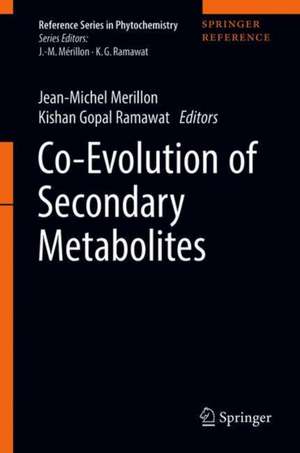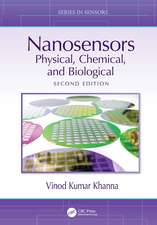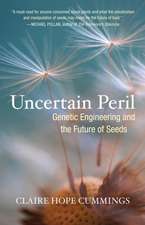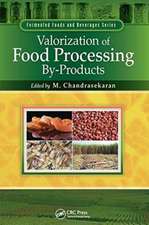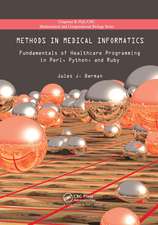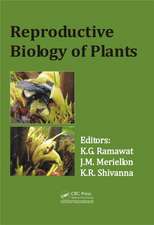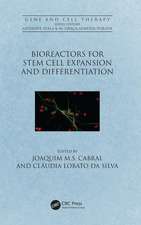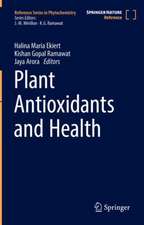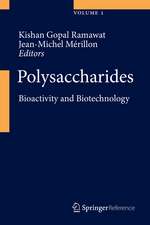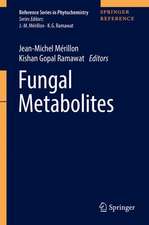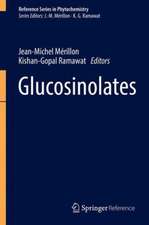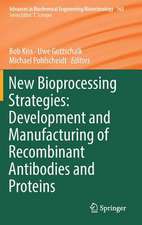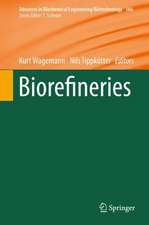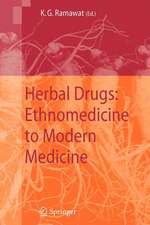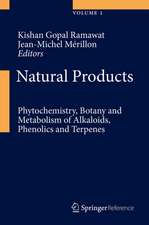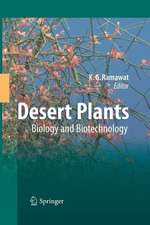Co-Evolution of Secondary Metabolites: Reference Series in Phytochemistry
Editat de Jean-Michel Mérillon, Kishan Gopal Ramawaten Limba Engleză Hardback – 23 feb 2020
Chapters from expert contributors are organised into twelve sections that collate the current knowledge in intra-/inter-specific diversity in plant secondary metabolites, changes in secondary metabolites during plants’ adaptation to different environmental conditions, and co-evolution of host-parasite metabolites. Among the twelve themed parts, readers will also discover expert analysis on the genetics and chemical ecology evolution ofsecondary metabolites, and particular attention is also given to allelochemicals, bioactive molecules in plant defence and the evolution of sensory perception in vertebrates.This reference work will appeal to students, researchers and professionals interested in the field of plant pathology, plant breeding, biotechnology, agriculture and phytochemistry.
Din seria Reference Series in Phytochemistry
- 18%
 Preț: 3887.64 lei
Preț: 3887.64 lei - 18%
 Preț: 1209.06 lei
Preț: 1209.06 lei - 18%
 Preț: 3188.68 lei
Preț: 3188.68 lei - 18%
 Preț: 3611.71 lei
Preț: 3611.71 lei - 18%
 Preț: 3315.78 lei
Preț: 3315.78 lei - 18%
 Preț: 2498.94 lei
Preț: 2498.94 lei - 5%
 Preț: 3549.78 lei
Preț: 3549.78 lei - 18%
 Preț: 1686.84 lei
Preț: 1686.84 lei - 18%
 Preț: 2132.75 lei
Preț: 2132.75 lei - 18%
 Preț: 2143.77 lei
Preț: 2143.77 lei - 18%
 Preț: 2498.14 lei
Preț: 2498.14 lei - 18%
 Preț: 2802.78 lei
Preț: 2802.78 lei - 18%
 Preț: 4501.15 lei
Preț: 4501.15 lei - 24%
 Preț: 1606.87 lei
Preț: 1606.87 lei - 24%
 Preț: 1545.41 lei
Preț: 1545.41 lei - 24%
 Preț: 1841.26 lei
Preț: 1841.26 lei - 24%
 Preț: 2842.90 lei
Preț: 2842.90 lei - 24%
 Preț: 2840.25 lei
Preț: 2840.25 lei - 9%
 Preț: 3584.63 lei
Preț: 3584.63 lei
Preț: 3423.86 lei
Preț vechi: 4505.08 lei
-24% Nou
Puncte Express: 5136
Preț estimativ în valută:
655.36€ • 712.11$ • 550.86£
655.36€ • 712.11$ • 550.86£
Carte tipărită la comandă
Livrare economică 16-22 aprilie
Preluare comenzi: 021 569.72.76
Specificații
ISBN-13: 9783319963969
ISBN-10: 3319963961
Pagini: 1300
Ilustrații: XXII, 973 p. 204 illus., 138 illus. in color.
Dimensiuni: 155 x 235 mm
Ediția:1st ed. 2020
Editura: Springer International Publishing
Colecția Springer
Seria Reference Series in Phytochemistry
Locul publicării:Cham, Switzerland
ISBN-10: 3319963961
Pagini: 1300
Ilustrații: XXII, 973 p. 204 illus., 138 illus. in color.
Dimensiuni: 155 x 235 mm
Ediția:1st ed. 2020
Editura: Springer International Publishing
Colecția Springer
Seria Reference Series in Phytochemistry
Locul publicării:Cham, Switzerland
Cuprins
Intraspecific Diversity in Plant Secondary Metabolites.- Changes in Secondary Metabolites during adaptation of plants to life on land.- Secondary Metabolites in Pollination.- Allelochemicals.- Abiotic stress signals on secondary metabolites in plants.- Evolution of chemical ecology.- Co-evolution of host-parasite metabolites.- Vertebrates and sensory perception.- Genetics of secondary metabolites.- Secondary Metabolites in Host-parasite interaction.- Secondary metabolites in insect–plant interactions.- Bioactive molecules in plant defence.
Notă biografică
Prof. Dr. Jean-Michel Mérillon received his Pharm.D. (1979), Ph.D. (1984), and HDR (1992) from the University of Tours in France. He joined the same university as assistant professor in 1981 and became associate professor in 1987. In 1993, he moved to the Faculty of Pharmacy, University of Bordeaux, France, accepting a position as full professor. He is currently leading the “study group on biologically active plant substances” at the Institute of Vine and Wine Sciences, which comprises 25 scientists and research students. The group has been working on phenolic compounds from vine and wine for many years, mainly complex stilbenes and their involvement in health. Prof. Mérillon has supervised the doctoral theses of 20 students. He is involved in developing teaching on plant biology, natural bioactive compounds, and biotechnology.
Prof. Mérillon has published more than 150 research papers in internationally recognized journals, resulting in an H index of 48 (documents published between 1996 and 2019). He has co-edited books and reference works on secondary metabolites and biotechnology.
Throughout his career, Prof. Mérillon has traveled widely as a senior professor. Scientists from several countries have been and are working in his laboratory, and his research is supported by funding from the Aquitaine Regional Government, the Ministry of Higher Education and Research, and various private companies. In 2004, he founded the technology transfer unit “Polyphenols Biotech,” providing support for R&D programs for SMEs and major groups from the cosmetic, pharmaceutical, agricultural, and health-nutrition sectors.
Prof. Mérillon has published more than 150 research papers in internationally recognized journals, resulting in an H index of 48 (documents published between 1996 and 2019). He has co-edited books and reference works on secondary metabolites and biotechnology.
Throughout his career, Prof. Mérillon has traveled widely as a senior professor. Scientists from several countries have been and are working in his laboratory, and his research is supported by funding from the Aquitaine Regional Government, the Ministry of Higher Education and Research, and various private companies. In 2004, he founded the technology transfer unit “Polyphenols Biotech,” providing support for R&D programs for SMEs and major groups from the cosmetic, pharmaceutical, agricultural, and health-nutrition sectors.
Prof. Dr. Kishan Gopal Ramawat is former professor and head of the Botany Department, M.L. Sukhadia University, Udaipur, India, and can look back on longstanding research experience. He received his Ph. D. in Plant Biotechnology in 1978 from the University of Jodhpur, India, and afterward joined the university as a faculty member. In 1991 he moved to the M.L. Sukhadia University in Udaipur as associate professor and became professor in 2001. He served as the head of the Department of Botany (2001–2004, 2010–2012); was in charge of the Department of Biotechnology (2003–2004); was a member of the task force on medicinal and aromatic plants of the Department of Biotechnology, Government of India, New Delhi (2002–2005); and coordinated UGC-DRS and DST-FIST programs (2002–2012).
Prof. Ramawat had done his postdoctoral studies at the University of Tours, France, from 1983 to 1985, and later returned to Tours as visiting professor (1991). He also visited the University of Bordeaux 2, France, several times as visiting professor (1995, 1999, 2003, 2006, 2010) and Poland in 2005 during an academic exchange program (2005). Through these visits in France, Prof. Ramawat and Prof. Mérillon established a strong connection, which has resulted in productive collaborations and several book and reference work publications.
Prof. Ramawat has published more than 170 well-cited peer-reviewed papers and articles and edited several books and reference works on topics such as the biotechnology of medicinal plants, secondary metabolites, bioactive molecules, herbal drugs, and many other topics. His research was funded by several funding agencies.
In his research group, Prof. Ramawat has supervised doctoral thesis of 25 students. He is an active member of several academic bodies, associations, and editorial boards of journals.
Prof. Ramawat has published more than 170 well-cited peer-reviewed papers and articles and edited several books and reference works on topics such as the biotechnology of medicinal plants, secondary metabolites, bioactive molecules, herbal drugs, and many other topics. His research was funded by several funding agencies.
In his research group, Prof. Ramawat has supervised doctoral thesis of 25 students. He is an active member of several academic bodies, associations, and editorial boards of journals.
Textul de pe ultima copertă
This Reference Work is devoted to plant secondary metabolites and their evolutionary adaptation to different hosts and pests. Secondary metabolites play an important biological role in plants’ defence against herbivores, abiotic stresses and pathogens, and they also attract beneficial organisms such as pollinators. In this work, readers will find a comprehensive review of the phytochemical diversity, modification and adaptation of secondary metabolites, and the consequences of their co-evolution with plant parasites, pollinators, and herbivores.
Chapters from expert contributors are organised into twelve sections that collate the current knowledge in intra-/inter-specific diversity in plant secondary metabolites, changes in secondary metabolites during plants’ adaptation to different environmental conditions, and co-evolution of host-parasite metabolites. Among the twelve themed parts, readers will also discover expert analysis on the genetics and chemical ecology evolution of secondary metabolites, and particular attention is also given to allelochemicals, bioactive molecules in plant defence and the evolution of sensory perception in vertebrates.This reference work will appeal to students, researchers and professionals interested in the field of plant pathology, plant breeding, biotechnology, agriculture and phytochemistry.
Chapters from expert contributors are organised into twelve sections that collate the current knowledge in intra-/inter-specific diversity in plant secondary metabolites, changes in secondary metabolites during plants’ adaptation to different environmental conditions, and co-evolution of host-parasite metabolites. Among the twelve themed parts, readers will also discover expert analysis on the genetics and chemical ecology evolution of secondary metabolites, and particular attention is also given to allelochemicals, bioactive molecules in plant defence and the evolution of sensory perception in vertebrates.This reference work will appeal to students, researchers and professionals interested in the field of plant pathology, plant breeding, biotechnology, agriculture and phytochemistry.
Caracteristici
Reviews key recent research in plant secondary metabolites Elucidates the co-evolution of secondary metabolites with plant parasites, pollinators and herbivores Broadens knowledge of secondary metabolites in plant defence Includes supplementary material: sn.pub/extras
